US Embassy hosts exclusive Rock Festival
Ambasovishcha Festival to be broadcast live on web
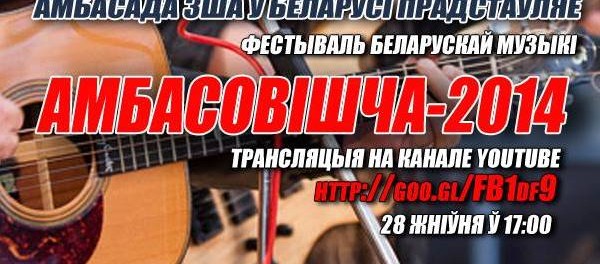 Art via Facebook
Art via Facebook
Ask anyone in the neighboring countries what Belarus is about, and they’ll tell you it’s boring.
There might be a little rivalry hedged in that answer, though. When you dig below the surface, you actually find quite an array of talented stage acts that never seem to get the right amount of airplay to garner any significant attention outside of this country, Bi-2 notwithstanding. If you know where to look, though, you can find the potential for any number of impressive scenes just waiting to happen, just waiting for the right venues and festivals to give them the chance to play to appreciative audiences.
However, in the midst of this fascinating array of home talent, a once-a-year gathering brings together not only a select group of acts, but also a selected audience. This exclusive party is called the Ambasovishcha Festival, and it takes place behind the stone walls of the U.S. Embassy in Minsk.
This year, the Ambasovishcha Festival will be held on Thursday, August 28, and if you haven’t secured your invitation yet, you are probably out of luck. Under the current global threat of terror attacks on US facilities, organizers require about 3-4 days to screen participants to ensure that the unthinkable doesn’t happen in this quiet corner in the center of Europe. However, for those outside the walls who have an internet connection, the event will be live-streamed via a link accessible from the Embassy’s Facebook page.
The first Ambasovishcha Festival took place in 2005, an initiative carried out under New Jersey-native George A. Krol, who served as the US Ambassador to Belarus at that time (today he represents the US as its Ambassador in Uzbekistan). A year later, Karen B. Stewart established it as a yearly tradition after her arrival, and kept the celebration of Belarusian music going for the two years she would serve in the post as the last US Ambassador to the country (at least to this date). Jonathan M. Moore, Michael Scanlan, and Ethan A. Goldrich likewise maintained the tradition going through their years as Charges d’Affaires of the US Embassy in Minsk.
This year, under Scott Rauland’s watch, the party continues with the 10th annual festival. Eight acts have been selected for what is certainly Minsk’s most exclusive rock concert, and these acts are about as diverse as a music enthusiast would hope to find in the unsung capital of Eastern European talent.
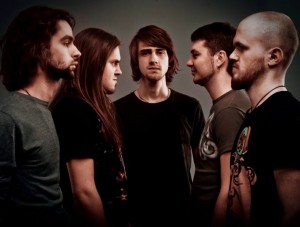
The Homyel rock group Re1ikt consists of Vladimir Kozlov (lead vocals), Alexander Demidenko (or Aliaksandr Dziemidzeinka in Belarusian, drums), Vitaly Makshun (guitar), Dmitry Narkevich (bass guitar) and Ilya Ryabtsev (guitar). Photo via US Embassy in Minsk on Facebook
Re1ikt: These guys have been around long enough that they can claim the title of being a seminal act. Having formed in the southeastern town of Svetlahorsk in 1999, the group, mostly school-aged aficionados of grunge and college alternative music, was unstable in its first five years. But by 2005, drummer Alexander Demidenko, the sole survivor of the group’s earliest years, connected with Vladimir Kozlov and a new cadre of performers. They moved to the regional capital of Homyel. From there, the band released their first studio album “Yedinitses” and began to book gigs with the likes of Agata Kristi and Zdob si Zdub. By 2008, though, the band again underwent drastic changes in lineup, which continued to plague it through its slow migration to a harder rock style. Meanwhile, following the release of their second studio album “Clinic”, they achieved a reputation for social awareness through performances at benefit concerts promoting AIDS awareness and against domestic violence. After a brief 8-month break between front man Kozlov and the rest of the band shortly following the release of their third studio album “Reki prabili lyod”, the band effectively re-formed into their current lineup, with Ilya Ryabtsev being the last addition to the five person act.
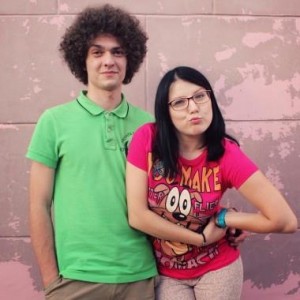
Founding members of Navi Band are Artem Lukyanenko and Xenia Zhuk. Photo via US Embassy in Minsk on Facebook
Navi: Usually, this group goes by the name “Navi Band,” so as to differentiate themselves from the aliens in Avatar and the Michael Jackson impersonator that performs by the same name. This group, whose name came from a sign that Lukyanenko saw when the two were trying to think of a name for their act, formed as a duet between Artem Lukyanenko and Xenia Zhuk (whose surname translates to “Beetle” in English). Their stated influences seem to be mostly pop-oriented, and include the likes of Lady Gaga and Sting, and indeed, they have competed to be entered in the Eurovision contest as representatives of Belarus. However, their greatest actual connection with the music world seems to have been the group’s friendship with Diana Arbenina of the popular Russian alternative group Night Snipers. In an interview, the two performers said that their relationship with the star, who has performed in a number of solo projects lately, began when they simply sent a demo tape to her. Arbenina apparently liked what she heard and had the two come to Russia to perform with her. Their most recent release has been a single entitled “Shchastsye” or Happiness, and their lineup was finalized quite recently at a concert held in the Minsk venue Re:Public on July 17, with a bass player and drummer joining the founding duo as backup. Though they consider the music business in Belarus to be rather helpless at the moment, the group intends to stay true to who they are, and to remain optimistic about where they are going.
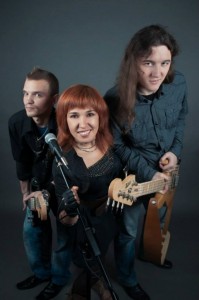
Backing Yulia Glebova in Chas Speak are: Yuri Zhukarev, bassist (shown); Dmitry Tutsky, guitarist (shown); Ivan Arkhipenko, keyboardist; and Andrey Saponenko, “one of the best drummers in Belarus.” Photo via the US Embassy in Minsk on Facebook
Chas Speak: Selecting a name that is half in Russian and half in English, the group appears to play bilingually on words, as the name sounds quite similar to the Russian “chas pik” or Peak Hour. The lead singer and band founder Yulia Glebova sought to make her act a way to express her philosophical side when she first went into the music world. Today, she regards her music as a combination of what she calls “intelligent rock,” a slightly more serious Belorussian version of sophisti-pop, and pop music with a philosophical subtext to it. She generally ignores critics who attempt to belittle her efforts as somehow derivative. She definitely disagrees with those who call her the “Belarusian Zemfira,” though she finds inspiration in that Russian artist’s works, along with that of the Night Snipers, who also became popular in the same period, 15 years ago. If there is any confusion, her songs are solidly her own, and her band claims that they have the strength of sincerity. Somewhat reminiscent of Dead Can Dance’s Lisa Gerard’s infatuation with the yangqin, Glebova plays the Belarusian version of the hammered dulcimer, the cymbaly. Most of her songs are in Russian, but her one English-language song, “Hey, Look” was featured at Eurofest 2012. Chas Speak has one album out, called “Neformat” or Curiosities, and her group has a second album in the works.
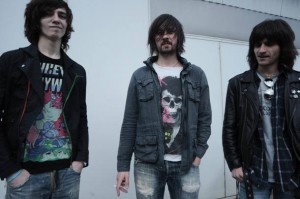
JimWin (Dzimitry Vinitski), guistarist and vocalist; Mr. Short (Andrei Korotchanka), drums; Valik (Valiantsin Muryn), bassist. Photo via the US Embassy in Minsk on Facebook.
2Morrow2Late: This rock trio was founded in September 2009 after Dzimitry Vinitski returned from a “pilgrimage” to the London rock scene. Taking on the moniker “JimWin”, he recruited the other two members of the band shortly after: drummer Andrei Korotchanka, and bassist Valiantsin Muryn. Andrei, who followed his father’s footsteps to the drum set, took on the stage name of Mr. Short, while Valiantsin, formerly a glam rocker, merely used the short version of his regular name, Valik. The trio play a style of rock said to be something akin to the Foo Fighters meets the Queens of the Stone Age, a sort of late 90s post-Nirvana Seattle-like sound. After more than two years together, the trio put out their debut album in 2012, entitled “Songs that make you happy.” Today, they regularly tour Belarus, and they claim that they enjoy nation-wide recognition. Soon, they plan to tour Europe and extend that recognition beyond the borders of the country.
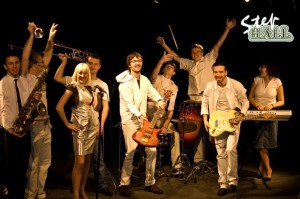
In the lineup for Step Hall, Igor Latushko plays bass guitar, Boris Karavayev plays drums, Sergey Losev plays keybords, Stepan Shimko plays trumpet, and Nicholas Lifanov plays trombone. Yulia Chukhareva and Yelena Gavrusenok back Andrei Bibikov, lead and guitarist, on vocals. Photo via the US Embassy in Minsk on Facebook.
Step Hall: Although they feature a line up more reminiscent of a ska band, Step Hall is actually a jazz-funk group with seven members. Founded on Valentine’s Day 2011 by popular theatrical actor, lecturer and TV personality Andrei Bibikov, they’ve been popular in Minsk from the start. This is probably the result of Bibikov’s presence on BelMuz TV and NTV-Belarus. Recently, they announced their line-up had expanded to seven people, and now projects energy equal to that of a perfectly harmonized family. Except this family plays guitar, bass guitar, drums, keyboard, trumpet, and trombone. Their most popular songs are titled in English “Stop This Night,” and “The Show.”
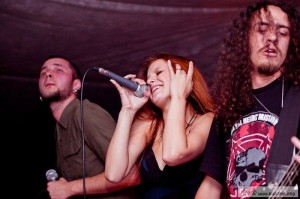
Terrakod features Kasia Levanuk and Baisan as vocalists, Aliaksandr Jakubouski as guitarist, Leanid Bachdanovicz as bassist, Valeryj Malaszdzuk as duda player, and Arciom the Drummer, on drums of course. Photo via the US Embassy in Minsk on Facebook.
Terrakod: This group comes from one of the places where folk traditions are strongest in Belarus, the Polesya of southern Brest voblast. They describe themselves as a “creative collaboration of experienced musicians” that have set themselves out on a mission to “compile ethnic Belarusian heritage using nu-metal and alternative sounds.” They have also been described as a folk-hardcore metal group that sings in both Polish and Belorussian languages, renowned or their bagpipes and vocal couple in the lead. They would be the cultural equivalent of the Western Ukrainian in Belarus, striving to maintain a connection through groove and dance with their ancestral roots. They are currently compiling an album, and their most recently released song is a Belarusian dedication to Ernest Hemingway, and perhaps his taste for mojitos, called “Myata” or Mint.
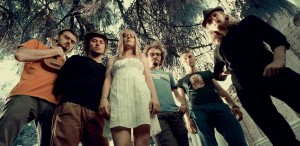
Landau’s lineup features Lena Kaleynikava as vocalist, Andrew Kuharchuk as guitarist, Andrew M. as guitarist, Eugene Liauchuk as bass guitarist, Roman as drummer, and Victor as keyboardist. Photo via the US Embassy in Minsk on Facebook.
Landau: In 2010, the Brest-based metal-core band Intra Muros, which had gained some fame over the previous four years, had disintegrated. In its wake rose Landau, named for the Soviet physicist Lev Landau. Initially, the group did only instrumental pieces along the same lines as post-rock music, but then came Lena Kaleynikava. She brought words back to the music and by 2012, the group was ready to release its first EP, entitled “About”, a recording that contained only English songs. Since then, the group has been working on their second release, to come out soon. In April, one of the first tracks of the second release was put out, an experimental Belarusian-language single entitled “Sniezhan” or December. This piece gloomily looked back at the tumultuous events of December 2010 in Minsk in a way that is better said through music than written words. The group has played gigs in Belarus, Poland, and at a couple coffee shops in the southern Ukrainian cities of Odessa and Kherson. Today, Landau describes itself as post-lounge, a genre which seems to beg curiosity.
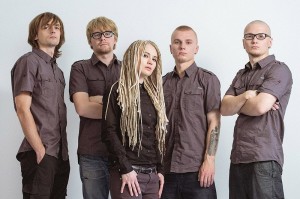
NGe’s lineup features Olga Borozna as vocalist, Yegor Petrovich Friskis and Alexander Zhigalov on guitar, Pasha Zayats as drummer, and Vladimir Makarevich on bass. Photo via the US Embassy in Minsk on Facebook.
NGe: In May 2008, this group formed in a Minsk apartment kitchen one evening at 2 in the morning, so the band said on its VKontakte page, and began playing as an alternative rock band in the local scene. Supposedly this was to force a change of lifestyle on everyone involved. After several months of intensive rehearsal, the band had enough songs in Russian and Belarusian to put together an entire album. It was then a question of how to put together the contacts and resources to get it all recorded. Since then, they’ve had a measure of success. Indeed, on the fifth anniversary of the band forming, the group released its EP “Liana and the Three Monkeys” at a special show at the Minsk venue Club Doodah King. They followed this success up with their song Room 101, a work inspired by George Orwell, in February this year, around the time of the Sochi Olympics. The song is likely to be the first track on a new EP that the band is working on. (Not to be confused with “Neon Genesis Evangelion,” an anime that frequently uses NGE as a moniker.)


Leave a comment